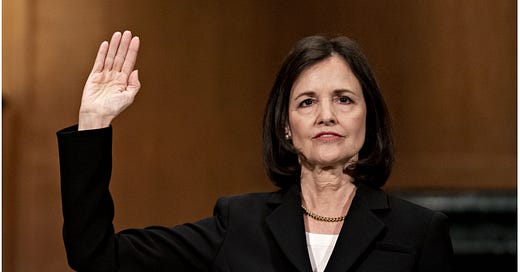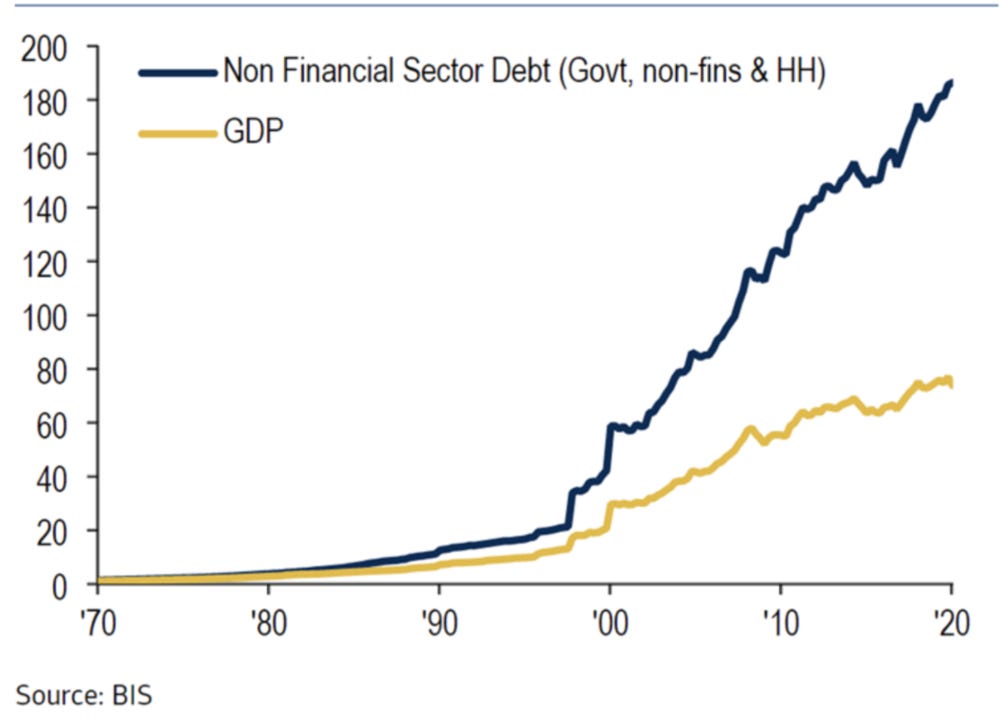Canary in the Gold Mine
Who says there is no bi-partisan agreement?
When it comes to monetary policy, everyone is pretty much aligned: more dollars, please!
This fact became obvious with the chorus of criticism for Judy Shelton’s nomination to the Federal Reserve Board of Governors. “God help us,” said Steve Rattner in the N.Y. Times. The conservative National Review lamented her ideas as “unrealistic” and “dangerous.” And Slate, well they just reduced her to being a “crank.”
Of course, politics has some role in this catastrophic talk. Shelton is a Trump appointee and has publicly betrayed many of her long time views to appeal to him. Flattering the boss for promotion is not an admirable quality, but it was not the real issue for her critics. They don’t worry that she agrees with Trump, they worry she doesn’t!
What are these dangerous beliefs? Judy Shelton advocates for the gold standard - or the idea that the US dollar should be backed by a real asset - not just giving it tangible value but minimizing our ability to manipulate the money supply. It’s easy to argue against this point of view. The Fed has taken action to limit the damage to our economy many times. It’s power to impact interest rates and inject liquidity are effective tools that can get a sluggish economy going again. And Trump loves these tactics - he has been pushing for lower rates since he got in office. But he has not exactly been a deficit hawk. He might want some balance on the Board, but hard to believe he really wants what Shelton is preaching.
The problem with money manipulation is it eventually compounds into a LOT of money manipulation. Seems to me the Fed has crossed this threshold!
Wonder why the stock market hits new highs when the economy is in shambles? Curious about how housing prices keep rising despite mass unemployment? Seem odd that the US savings rate is hitting new highs in a pandemic? Well, you can thank the Fed.
While tax and spending policies are easy to understand given their direct impacts, the mechanics of the Fed are obscure but maybe even more important. In fact, the Fed has been the center of economic policy action since at least 2008.
How? Well as we reach a projected $4 trillion deficit this year (our top deficit in the last financial crisis was roughly $1.4 trillion), we issue bonds to pay for it. Who buys them? These days… the Fed! They print the money, give it to the government and get a bond as a promise of repayment. We are literally borrowing from ourselves. We are doing it because if the market had to absorb all that debt, interest rates would rise, slowing our whole economy and increasing our debt payments. The game does not stop there. They also need to keep private rates down - the interest rate you, me and our businesses get in our loans. So here comes the Fed - buying trillions in mortgages and private debt securities to ensure rates stay low. Voila, credit, the biggest market in the world is now price-controlled! The capitalists might benefit, but this is not capitalism.
Defenders (that would be almost everyone) will say this is not printing money. The Fed traded dollars for bonds - an asset for a liability. All are equal. But when and how will we ever pay for it? And how do you back off a regime of zero interest rates now? The debt load, both public and private, is so large that any upward move in interest rates is sure to trigger a default crisis. We already spend $500bn on interest a year. Imagine if rates tripled - all while the debt load is growing. We can’t let it happen.
Plus so far it hasn’t caused much of an issue (well, maybe just a touch of income inequality). And since there have been no negative repercussions, the temptation is to print even more - big spending on the left, more tax cuts on the right!
This Ponzi Scheme can’t go on forever. Eventually, the bill will have to get paid or the printing will get so big that we will inflate it away by printing so much money the dollar loses its value (see Gold and Bitcoin are evidence of this already happening). If you liked America in the 1970s, well it might just be a preview of what is to come - low growth, high inflation.
So does Shelton have the answers? I have no idea what she really wants and hard to believe even she would stop all the stimulus during COVID. Truth is there is no easy answer. But, does a hard money voice (i.e. less money printing and credit manipulation) in a room of seven soft money voices seem like a “crazy” idea? Does questioning the constant distortions in credit markets seem “dangerous”? Can we not debate the threat of current inflation in the economy and how it could get much worse as we print more money? Do we not need a voice to defend the value of the dollar and the hidden tax (especially to the poor) of its destruction? Both sides of the aisle seem to say no.
There is simply no incentive to face these real problems. Elections are not won on proposing hard choices. Printing money is easy and in the short term, it works. But, like a drug, it takes a toll and needs more and more feeding. The bubble keeps growing, and each crisis gets worse than the last. Eventually, someone will have to deal with it.
PS. In 1971, the US got completely off the gold standard. While correlation is not causation, this series of charts showing core economic metrics before and after is stunning. Seems like a robust debate on various monetary policies are worth having! And if you really want a good summary of the history of money printing and its effects, the Bitcoin Standard is essential.
Good Reads - December 2020
Why does anyone listen to big banks anymore? A history of Goldman’s Sell ratings on Tesla. Now, at crazy prices, they finally issued a buy. Thanks for nothing.
Widespread glucose monitoring is going to definitively settle our carbs vs. calories debate. I am waiting for my Levels monitor - eager to get it.
Altruism is not just a theory. Chuck Feeney gave away 99.9% of his billions - all anonymously.
How to be skeptical by Bertrand Russell. “Passion is the measure of the holder’s lack of rational conviction.” Uh oh. But a good summary of how to think about experts.
My favorites books read this year include: Pachinko, How Adam Smith Can Change Your Life (not about economics), The Glass Hotel, The Price of Tomorrow, Dreamland, Broken and Red Notice - most published before this year




